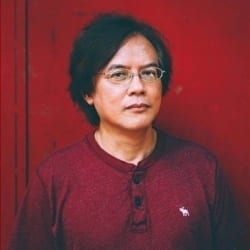 For Immediate Release Nov. 2, 2022
For Immediate Release Nov. 2, 2022
Sinophone Novelist Chang Kuei-hsing Wins 2023 Newman Prize for Chinese Literature 張貴興荣获2023年美国纽曼华语文学奖
NORMAN, OKLA. – An international jury has selected the Sinophone novelist Chang Kuei-hsing (張貴興) as the winner of the eighth Newman Prize for Chinese Literature.
Sponsored by the University of Oklahoma Institute for US-China Issues in the David L. Boren College of International Studies, the Newman Prize is awarded biennially in recognition of outstanding achievement in prose or poetry that best captures the human condition, and is conferred solely on the basis of literary merit. Any living author writing in Chinese is eligible. A jury of five distinguished literary experts nominated the seven poets last spring and selected the winner in a transparent voting process on Oct. 26, 2022.
Chang Kuei-hsing will receive $10,000, a commemorative plaque and a bronze medallion. He will be celebrated at an online symposium and award ceremony held on the OU Norman campus March 2-3, 2023. Chang Kuei-hsing was nominated for the prize by Professor E.K. Tan (Stony Brook University). Other nominees and jurors include:
- Dorothy Tse (謝曉虹), nominated by Frances Weightman (Leeds University)
- Zhuo Kai (周恺) nominated by Ou Ning (Columbia University)
- Yu Hua (余华) nominated by Sabina Knight (Smith College)
- Bi Feiyu (毕飞宇) nominated by He Ping (Nanjing Normal University).
Chang Kuei-hsing was born in 1956 in Sarawak, Borneo, and his work emerges out of the cultural, ethnic and political struggles of the Chinese community in Malaysia. He left Malaysia in 1976 for Taiwan to attend the National Taiwan Normal University and still resides in Taiwan.
His most well-known novels are his Rain Forest Trilogy, which are set in Borneo and include The Elephant Herd, The Primate Cup and My South Seas Sleeping Beauty, all of which have been extensively discussed in Taiwan and across Sinophone literary scholarship.
Tan points out that “all three novels involve the theme of both a physical and spiritual return to the tropical rainforest as a necessary journey to uncover a family secret of the Sinophone Malaysian main character, traversing several generations. Through the journey of the character in each of the novels, localized aspects of Sinophone Malaysia identity and experience are depicted and inscribed as a reaction to circumscribe an ethnic history and identification representative of the Chinese diaspora community in Borneo.”
“Once again, this year’s nominees reveal the incredible wealth and diversity of Sinophone literature today, and Chang Kuei-hsing’s singular work truly reflects the spirit of the prize which is awarded to the any writer publishing fiction or poetry in the Chinese script,” said Jonathan Stalling, co-director of the Institute for US-China Issues and director of the Newman Prize.
Tan argues that “the uniqueness of Chang’s writing lies in its fusion of literary aesthetics and narrative styles from the East and the West: his portrayal of the plantations in Borneo reads like a transplant of Faulkner’s American South to the Indonesia Archipelago, and his stream of consciousness style narrative traversing between the character’s psychic and the tropical rainforest terrain inject Chinese literature with a unique sensorial experience similar to that of Gabriel García Márquez’s magical realism. In a sense, it is not at all far-fetched to claim that Chang’s writing can be read as a unique branch of Chinese literature as world literature.”
The Newman Prize honors Harold J. and Ruth Newman, whose generous endowment of a chair at the University of Oklahoma enabled the creation of the OU Institute for US-China Issues in 2006. OU is also home to the Chinese Literature Translation Archive, Chinese Literature and Thought Today, World Literature Today and the Neustadt International Prize for Literature.
Previous winners of the Newman Prize include Mainland Chinese novelists Mo Yan (莫言) in 2009, Han Shaogong (韩少功) in 2011, Wang Anyi (王安忆) in 2017 and Yan Lianke in 2021. Mo Yan went on to win a Nobel Prize in Literature in 2012. Taiwanese poet Yang Mu ( 楊牧) and novelist and screenwriter Chu Tien-wen (朱天文) won the Newman Prize in 2013 and 2015, respectively, and Hong Kong writer Xi Xi (西西) won the Newman Prize in 2019. For more information, please visit the Newman Prize website or contact Jonathan Stalling at
Contact: Jonathan Stalling Co-Director, Institute for US-China Issues Office: (405) 325-6973 stalling@ou.edu